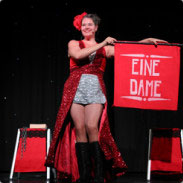The European summer is approaching, and with it a delightful array of festivals in different towns, in different countries… and in different languages.
In my opinion, when you arrive to a place where they speak a different language to you, it is polite to be equipped with at least a handful of words and phrases in their language, even if you are pretty sure that most people will be able to talk with you in English. Below are a few phrases that you won’t find in regular phrasebooks, specifically useful for arriving to a festival and getting set up for a show.
When it comes to the actual performing of a show I am a big fan of translating your show to other languages (or making it non-verbal). There are plenty of people who perform in English, regardless of the language of the place, and it works out for them brilliantly. For me, I usually translate into the language of the place, even if they speak English well (the text in my show is very simple and minimal anyway). I find it creates another fun element of comedy in the show, creates a stronger bond with the audience and also means that even the very old or young can understand. It’s polite… In october I will be in Japan… and as daunting as learning my show in Japanese seems now, I will try (I may well end up with a script tucked in my bra for saftey though!)
The phrases below are written in English then translated to German first, French second. The translations were done with the help of a brilliant aerialist I have been working with Kaleen McKeeman – an American artist who has become startlingly fluent in both French and German.
Tips for pronunciation in German:
- v is pronounced with an f (eg. ‘von’ is said ‘fon’)
- w is pronouced like our v
Tips for pronunciation in French:
- ‘Est-ce que’ means that you are asking a question and is pronounced ‘ess-ker’
- often the words ending in ‘er’ are said as if they are written ‘ay’
Arriving
Hi I am (name) from (company/show).
Hallo, Ich bin (insert name) von (insert company/show name)
Salut, je suis (insert name) de la compangnie (insert company/show name)Where is the dressing room / stage
Wo ist die Garderobe / die Buehne
Oue sont les loges / Ou est la sceneWhere can I put my things?
Wo kan ich miene Sachen hinstellen?
Ou est-ce que je peux deposer mes affaires?Is my stuff safe here overnight?
Sind meine Sachen hier nachts sicher?
Est-ce que mes affaires sont securitaires pendant la nuit?Where can I park my car?
Ou est-ce que je peux stationer mon auto?
Wo kann ich mein Auto parken?I need to rehearse / warmup / prepare
Je dois repeter /me rechauffer/preperarer
Ich muss proben /mich aufwaermen/ vorbereitenWho should I talk to about…
An wen soll ich mich wenden fuer ……
Avec qui je devrais parler pour ….Where is the nearest…
Wo ist der naechste …
Ou est la … la plus proche
Technical Setup
When should I meet the technician? (at the stage?)
Wann soll ich den Techniker treffen? (an der Buehne?)
Quand est-ce que je dois rencontrer le technicien? (Sur la scene?)Can I test the sound system?
Kann ich bitte einen Soundcheck machen?
Est-ce que je peux tester le son?Power outlet
Steckdose
La prise d’electriciteExtention chord
Verlaengerungskabel
Cable d’electriciteCan I please use a…
Kann ich bitte …. benutzen?
Est-ce que je peux utiliser ….?I need a…
Ich brauche …
J’ai besoin de …The cue is…
Der Cue ist
Le cue estThis (point to the thing) is not working
Das fonktioniert nicht
Ca ne fonctione presentement pas
Setting up
What time should I start/end?
Wann soll die Show beginnen/beenden?
Quand est-ce que je dois commencer/finir le spectacle?The show is at (time)
Die Show ist um …. Uhr
Le spectacle commence a … heureThe show lasts … Minutes
Die Show dauert …. Minuten
Le spectacle dure … minutesThe show begins in … minutes
Die Show beginnt in …. Minuten
Le spectacle commence en … minutesCan you help me with this please?
Koennen Sie mir bitte damit helfen?
Est-ce que vous pouvez m’aider avec ca?I don’t need any help, thanks.
Ich brauche keine Hilfe, danke
Je n’ai pas besoin d’assistance, mercieThanks for your help.
Danke fuer deine Hilfe
Merci pour votre assistanceDo you want help with that?
Kann ich dir damit helfen?
Est-ce que vous voulez assistence avec ca?When do the public arrive?
Wann kommt das Publikum?
Quand est-ce que le public arrive?That is perfect
Das ist perfekt
Ca c’est parfaitLike this (when demonstrating how something is done)
So (pronounced ‘zo’)
C’est comme caAre you ready
Bist du Bereit?
Est-ce que vous etes pret?I am ready.
Ich bin bereit
Je suis prêteI need 5 minutes (not ready yet)
Ich brauche noch 5 Minuten
Je besoin encore 5 minutesHere
Heir
IciThere
Da
La bas (pronounced La Ba)Eat & Drink
Can I have some water please
Kann ich bitte Trinkwasser haben?
Est-ce que je peux avoir de l’eau?Do you have anything gluten-free / vegetarian
Haben Sie etwas Gluten-freies / Vegetarisches?
Est-ce qu’il y a quelque chose sans gluten / vegeterienne?

